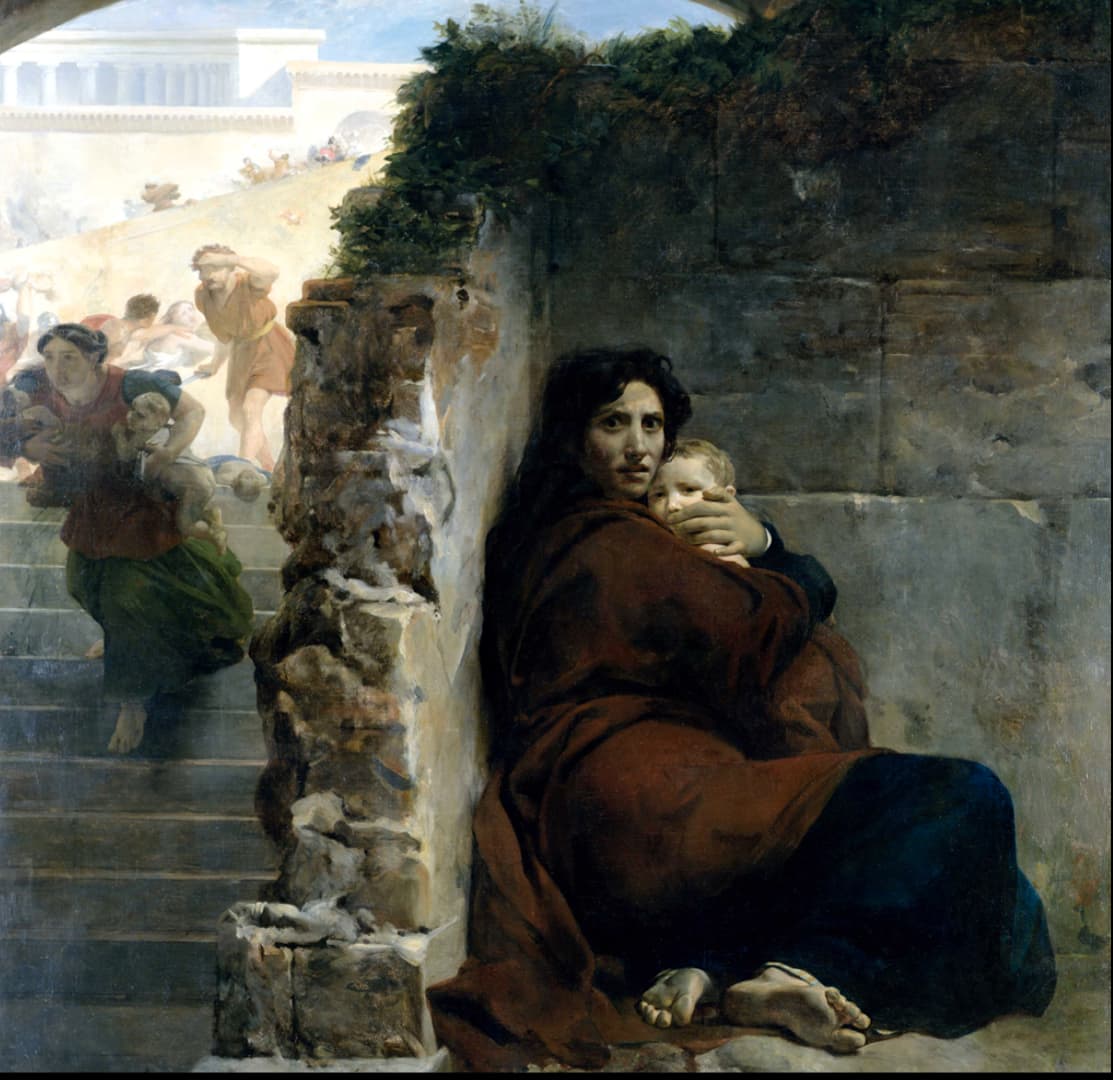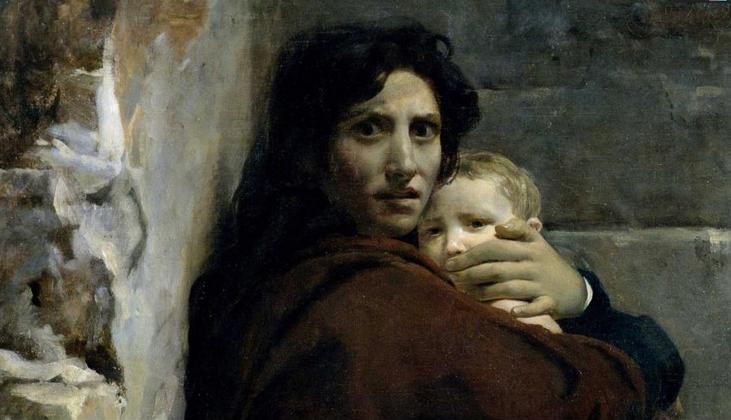December 29: Weeping at Christmas
♫ Music:
Tuesday, December 29
Scripture: Matthew 2:16-18
Then Herod, when he saw that he had been tricked by the wise men, became furious, and he sent and killed all the male children in Bethlehem and in all that region who were two years old or under, according to the time that he had ascertained from the wise men. Then was fulfilled what was spoken by the prophet Jeremiah: “A voice was heard in Ramah, weeping and loud lamentation, Rachel weeping for her children; she refused to be comforted, because they are no more.”
WEEPING AT CHRISTMAS
At Christmas time, we tend to quickly bypass the handful of verses in Matthew about Herod’s slaying of children. I cannot recall a children’s Christmas pageant when an elementary school child wearing her red velvet dress stood in front of the church for her recitation and said, “Herod gave orders to kill all the boys in Bethlehem and its vicinity who were two years old and under.”
This doesn’t happen.
Part of me wishes someone had plucked these verses from the Bible. Why did Matthew have to include this chilling, macabre incident in the story of Christmas? Isn’t it antithetical to the spirit of Christmas?
But there it is, right in the Bible. Not by mistake. On the same streets where Jesus was born were families who’d soon lose their innocent little boys at the hand of the desperate despot Herod. How do we reconcile the joyful birth of our Jesus with the bloody deaths of those boys? In The Brothers Karamazov, Ivan poses a question to his spiritually sensitive brother, Alyosha. Ivan, the intellectual agnostic, asks: “But what about the children? How will we ever account for their sufferings?”
I suppose the mothers of Bethlehem, like the one so vividly captured in Leon Cogniet’s somber painting, had similar questions. I suppose if they knew that Joseph had been warned by God in a dream to flee Bethlehem and dodge the sword of Herod, they would have asked, “Why didn’t God send us a dream too? Why did Jesus get away, protected by the angels, but not us?”
One writer commented that “Jesus had to get away in order to face the day [on the cross] when the angels would not intervene and when Joseph would not whisk him to Egypt, when Mary, not Rachel, wept and could not be comforted.”
Jesus got away so that he could later atone for the blood of those children and their mothers’ tears. Christ came amidst the pain of life in order to redeem the pain of life. N.T. Wright says that Jesus went “solo and unaided into the whirlpool [of evil] so that it may exhaust its force on Him and let the rest of the world go free.”
In Jeremiah’s passage, quoted here in Matthew 2, we see that following Rachel’s lament the prophet writes, “Do not weep any longer, for I will reward you. Your children will come back to you.”God’s portrait of grief—the weeping mother—is painted over with his picture of pure unbounded joy in the image of children returning. Isaiah writes, “See, I will give you a signal to the godless nations. They will carry your little sons back to you in their arms; they will bring your daughters on their shoulders.”
So Rachel will be comforted after all.
Even Dostoyevsky was able to answer the skepticism of Ivan through the words of a godly monk named Zossima, comforting a grieving mother: “Don’t you know how bold these little ones are before the throne of the Lord?… Weep, but every time you do, remember that your little son is… looking down on you from where he is now, that he sees and rejoices in your tears and shows them to God… You will shed a mother’s tears for a long time to come. But in the end your weeping will turn into quiet joy.”
This is the tension of Advent. For a long time to come, tears. In this world, we will face suffering. But because of Christ—his incarnation, crucifixion and resurrection—one day our weeping will turn into joy. We have reason to hope.
PRAYER
We remember today, O God, the slaughter of the holy innocents of Bethlehem by King Herod. Receive, we pray, into the arms of your mercy all innocent victims; and by your great might frustrate the designs of evil tyrants and establish You rule of justice, love and peace; through Jesus Christ our Lord, who lives and reigns with you, in unity of the Holy Spirit, one God, for ever and ever.
Amen.
-Book of Common Prayer
Barry Corey, President, Biola University
Massacre of the Innocents
Leon Cogniet
Oil on Canvas
Museum of Fine Arts of Rennes, Rennes, France
About the Artist and Art
Léon Cogniet (1794-1880) was a French history painter and neo-classical portraitist, especially known for his lithographs. He is probably best remembered as a teacher, with over one hundred well-known students. After an early period of classicism, he adopted a more romantic style focusing on dramatic subjects and color. Massacre of the Innocents powerfully depicts the slaughter of male children two years old and younger (recorded in Matthew 2). Cogniet’s rendition of the story depicts a terrified mother silently hiding in the shadows. She clutches her son, covering his mouth with two of her fingers to keep him quiet. The expression of fear and shock on the mother’s face helps us imagine the horror of this event.
About the Music
“Lament”
Lyrics
Jerusalem Jerusalem;
Convertere ad Dominum Deum tuum.
Defecerunt prae lacrimis oculi mei,
Conturbata sunt visera mea.
Lamentione.
Magna est enim velut, mars contritio tua;
Quiis mendebitur tui.
Jerusalem, Jerusalem;
Convertere ad Dominum Deum tuum.
Lamentione.
Effesum est in terra ie cur meum,
Super contritione filiae populi mei.
Cum deficeret parvulus,
Et lactens in plateis oppidi.
Jerusalem, Jerusalem;
Convertere ad Dominum Deum tuum.
About the Composer
Robert Gordon Prizeman (b. 1952) is a British composer and the founder of Libera. His championing of ethereal choral music has won him and his singers a fan base around the world. Prizeman has worked as a choirmaster since 1970 when, at the young age of 18, he took over the choir of St. Philip’s Church in Norbury. He has composed and arranged numerous works for Libera, including Lament. Since 1985, Prizeman has been a musical advisor to the BBC, working on programs such as Songs of Praise. In 2010, Prizeman was made an Associate of the Royal School of Church Music at Durham Cathedral.
About the Performers
Libera is an all-boy English vocal group directed by Robert Prizeman. Most members come from the parish choir of St. Philip's Norbury in South London. The group usually consists of approximately 40 members between the ages of seven and sixteen, including new members who are not yet ready to fully participate in albums or tours. The group recruits from a variety of backgrounds in the London area, and does not require its members to belong to any specific denomination. In addition to recording albums, touring and, making regular TV appearances as Libera, the group sings on a weekly basis as part of the full choir of men and boys at parish choral services. Libera is run as a not-for-profit registered UK charity, "providing the opportunity for suitable boys to train as vocalists from any background.” Members are not paid for their work within Libera, but their expenses are covered when touring. The group's name comes from its signature song, "Libera," which is based on the Libera Me portion of the Requiem Mass. “Libera" is the Latin word for "free.”
Website: www.libera.org.uk

